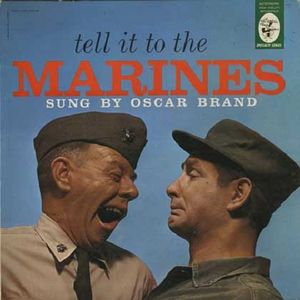Only 8 copies listed on WorldCat
Oscar Brand (born February 7, 1920) is a folk singer, songwriter, and author. In his career, spanning over 60 years, he has composed at least 300 songs and released nearly 100 albums, among them Canadian and American patriotic songs. Brand's music runs the gamut from novelty songs to serious social commentary and spans a number of genres.
"Tell it to the Marines" is a catchphrase, originally with reference to Britain's Royal Marines, connoting that the person addressed is not to be believed ("tell it to the marines because the sailors won't believe you").
Bless'em All Time: 1:27
Call Out the Corps Time: 1:06
Cuts and Guts Time: 1:26
Dinkie Die Time: 0:49
Gee But I Wanna Go Home Time: 0:58
Honey Baby Time: 0:58
Marine's Hymn Time: 1:03
Marine's Hymn [Instrumental] Time: 0:31
Moving On Time: 1:07
Old Number Nine Time: 1:02
Pua Pua Time: 1:21
The Man in the Moon Time: 0:57
The Reserves Lament Time: 0:49
The United States Marines Time: 0:51
Wake Island Time: 1:23
A bold young man about to enter the Louisiana swamps expressed a fear that he might be bitten by the poisonous snakes which abound there. An old-timer reassured him, "All you have to do is make a cross-cut on the place where you was bit, and then you can suck out the venom." The young man was unconvinced, "Supposing he bites me where I can't reach?" "Ah," replied the old-timer, "That's how you find out who your friends are."
The Marines need no such test for determining their loyalties. They have but one love, The Corps. Everything else is one hundred percent snake -- the Army, the Navy, the Coast Guard, the Civilians and the Enemy. The Corps has survived continuous efforts to abolish it -- including powerful attacts by Andrew Jackson, Theodore Roosevelt and Harry S. Truman. The Corps has survived thousands of attempts to wipe out its personnel in individual combat, by enemy action and barroom brawls.
The "insidious" network of buffs reaches into every walk of American life. I had no sooner announced my intention of recording an album of Marine songs when radio interviewer Ray Heatherton was singing Bless 'em All into my ear. On NBC's Today show, Eugene Jones, the seemingly harmless producer, slipped me a recording of Marines singing in a New Zealand Rest Camp, May 9th, 1943, after the landings on Tulagi and Guadalcanal. Most of the singers were killed in the next action at New Georgia, but their songs survived.
Knowing that Alvin Josephy, one of Time's senior editors, had been a correspondent for the Marines, I approached him diffidently and mentioned my project. He immediately pressed into my hot palm a long playing dub of the same New Zealand jam session -- with additional songs on it.
From Harold Peterson, of the Society of Military Collectors and Historians, came the priceless mimeographed folio published by the Death Rattler's Squadron which flew in Korea. The foreword of this collection of ribald, scurrilous and rollicking Marine songs read in part, "Even as we breathe in the breath, taking in the sight of a 40 mm. flak trap, or drink in the beauty of graceful arching tracers, these familiar strains are what make it worthwhile."
Other sources included civilians Jerry Wenker of Cambridge and Peter Seeger of Beacon, NY, whose World War II Letter From The Marianas hinted at many Marine Songs as yet uncollected. And it was advertising man Robert W. Block who told us about the secret horde of 1200 wire reels of Marine songs, hidden in the Library of Congress vaults because the language was unbecoming and over soldierly.
Finally let us thank the Marine Corps who made these songs .. Semper Fidelis.
Oscar Brand
